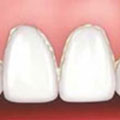What is Plaque?
Plaque is a soft, sticky, colorless film of bacteria and sugars that constantly forms on our teeth. It is the main cause of cavities and gum
How Do I Know if I Have Plaque?

Everyone develops plaque because bacteria are constantly forming in our mouths. These bacteria use ingredients found in our diet and saliva to grow. Plaque causes cavities when the acids from plaque attack teeth after eating. With repeated acid attacks, the tooth enamel can break down and a cavity may form. Plaque that is not removed can also irritate the gums around your teeth, leading to gingivitis (red, swollen, bleeding gums), periodontal disease and tooth loss.
How Can I Prevent Plaque Buildup?
It’s easy to prevent plaque buildup with proper care. Make sure to:
- Brush thoroughly at least twice a day to remove plaque from all surfaces of your teeth
- Floss daily to remove plaque from between your teeth and under your gumline, where your toothbrush may not reach
- Limit sugary or starchy foods, especially sticky snacks
- Schedule regular dental visits for professional cleanings and dental examinations
Plaque that is not removed daily by brushing and flossing between teeth can eventually harden into tartar.
What is Tarter?

Tartar, sometimes called calculus, is
Not only can tartar threaten the health of your teeth and gums, it is also a cosmetic problem. Because tartar is more porous, it absorbs stains easily. So if you are a coffee or tea drinker, or if you smoke, it is especially important to prevent tartar buildup
Tartar threatens
Once tartar forms, only a professional cleaning can remove it.
How do I know if I Have Tartar Buildup?
Unlike plaque, which is a colorless film of bacteria, tartar is a mineral buildup that’s fairly easy to see if above the gumline. The most common sign of tartar is a yellow or brown color to teeth or gums. The only way for sure to detect tartar — and to remove it — is to see your dentist.
How can I Prevent Tartar Buildup?
Proper brushing, especially with tartar control toothpaste, and flossing are necessary to reduce plaque and tartar buildup.
Once tartar has formed, only your dentist or hygienist,
American Dental Association
U.S. Department of Health and Human Services National Institutes of Health

